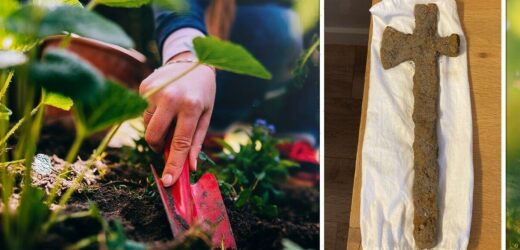Food traces found in Bronze age archaeology site
We use your sign-up to provide content in ways you’ve consented to and to improve our understanding of you. This may include adverts from us and 3rd parties based on our understanding. You can unsubscribe at any time. More info
Angela Smith, who served as Liberal Democrat MP for Penistone and Stocksbridge from 2010 to 2019 and for Sheffield Hillsborough from 2005 to 2010, tweeted her unexpected discovery on Friday. Alongside a picture of the artefact, she wrote: “We found this two days ago while digging our new back garden. Obviously an axe, but I wonder how old it is?”
The image shows a clear classic axe shape caked in dirt and rust. The handle appears to have a nail in the bottom.
The tweet has picked up considerable interest in archaeology and antique circles, with people offering to help identify and date the object.
One Twitter user under the name Labour Matters wrote: “If, in a month’s time, your garden is flooded with archaeologists and being dug up with a small trowel and a paintbrush, we will know that the answer was ‘pretty bloody old’.”
Others have questioned the find in a light-hearted manner – when user Sheron Boyle Media tweeted: “Bet the local museum would date it – let us know. Obv not a B&Q model.”, username Mark replied: “Don’t know, I got one from B&Q and it rusted pretty quickly!”
While the truth of the mystery garden axe has yet to be revealed, there is a real chance it could be something precious – and it wouldn’t be the first time a British gardener came across something remarkable during their toil.

In fact, during the long lockdowns of 2020 and 2021, as people turned to their own patch of land, some incredible artefacts were unearthed.
These included neolithic arrowheads, an ancient belt hook and parts of Roman pottery.
Peter Reavill, a finds liaison officer, said that fossils “found when people have been digging flowerbeds” were sent to the British Museum.
He said: “With so many people spending so much more time in their gardens, there have been some really interesting finds.
“I’ve seen some tobacco pipes, some pieces of pottery and even prehistoric flint tools found in people’s gardens.”

Other treasures unearthed included a post-medieval belt hook in the shape of a snake found in Herefordshire, and a medieval silver coin discovered beneath a lawn in Stoke-on-Trent.
In Coventry, a rock with script thought to date from the fourth century was found.
Meanwhile, eight fragments of Roman greyware pottery were found in the Leicestershire village of Wymeswold.
Mr Reavill said that, while garden finds might not often be valuable, they often say something “very interesting about the local history”.
He added that “people find stuff all the time, and put it on one side and say, ‘That’s interesting, I’ll do something with that’.”
However, it’s worth getting in touch with the pros if you do find something interesting – you never know if it might have value.
In 2021, Express.co.uk reported a Hampshire woman who was shocked to discover that a slab of rock she had been using for 20 years turned out to be worth £10,000 to £15,000.
She originally discovered the slab two decades previously and has been using it as a stepping stone for her stable.
However, after the years washed away some of the debris on its surface, she noticed strange carvings on the face of the rock.
After having it professionally checked by a local archaeologist, the woman was stunned to learn the object stemmed from the second century AD, with experts saying it either has Greek or Asian origins and may have been transported to these shores two centuries ago.

Michael Lewis, head of portable antiquities and treasure at the British Museum, urged gardeners not to be embarrassed about checking whether their discovery may be significant.
He said: “Finders can be shy about showing finds liaison officers their garden finds, but we are keen to see what is discovered by the public.
“Often people don’t realise the archaeological significance of what they find.”
People are urged to notify the British Museum’s portable antiquities scheme, at finds.org.uk, about the objects, which help experts and the public learn about the past.
Mr Lewis added: “Most finders get to keep their discoveries.”
Source: Read Full Article


